Showing 1-7 of 7 results
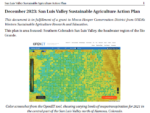
San Luis Valley Sustainable Ag Action Plan
This plan is area focused: Southern Colorado’s San Luis Valley, the headwater region of the RioGrande. Irrigation in this high, arid valley is from a combination of surface water from the Rio Grandeand its tributaries, and pumping from confined and unconfined aquifers. Because these waterresources are overdrafted and connected, managing for sustainability of agriculture involves […]
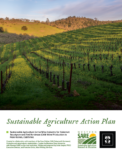
CAB Collective Sustainable Agriculture Action Plan
The Sustainable Agriculture Action Plan for Cabernet Sauvignon and red Bordeaux (CAB) Wine Production in Paso Robles is a document developed by the Paso Robles CAB Collective winegrape growers, winemakers, marketers, proprietors, and other wine industry stakeholders for under a pilot grant program by Western SARE.
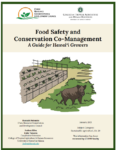
Food Safety and Conservation Co-Management: A Guide for Hawai‘i Growers
A guide for Hawaii farmers interested in improving their efforts towards food safety and improving natural resource conservation, through co-management practices. This document acts as a resource to both learn more about suitable techniques while reviewing pros and cons as shared by local producers, as well as provide template language and guidance towards implementing such […]
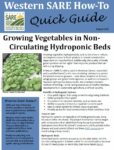
Growing Vegetables in Non-Circulating Hydroponic Beds
Growing vegetables hydroponically, such as bok choy or lettuce, can improve access to fresh produce in remote communities dependent on imported food. Additionally, the quality of locally grown produce can be higher than imported produce that can wilt during shipping. Download PDF
Photosynthesis & Hydroponics Lesson & Demonstration
Mt. Lata Farm in America Samoa created a Teachers' Resource Tool Kit with lesson plans on growing vegetables using hydroponics. This is one sample. For more information, contact the Project Leader .
Sustainable Agriculture Farming Systems Project
Public concerns regarding pesticide misuse, food safety, water use and contamination, and depletion of non-renewable resources have motivated the reevaluation of some of the practices of conventional agriculture and the exploration of alternative, more sustainable approaches to growing food. In 1988, the Sustainable Agriculture Farming Systems (SAFS) project was established at the University of California’s […]
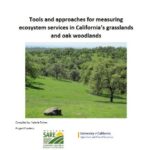
Tools and Approaches for Measuring Ecosystem Services in California's Grasslands and Oak Woodlands
Ecosystem services are the benefits humans receive from our natural ecosystems and working landscapes. These services include: forage production, erosion control, soil fertility, water storage, flood control, carbon storage, fire control, pollination, water purification, air purification, and others. While there is increasing interest in managing landscapes for multiple ecosystem services, very few management and restoration projects monitor their impacts, and thus we have little information on the effectiveness of management practices on ecosystem services. This project developed a monitoring handbook to increase monitoring efforts across management projects and to provide more consistent types of measurements across studies, which will make monitoring measurements more directly comparable.